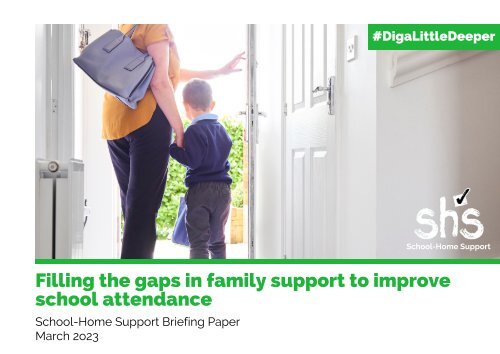Briefing Paper March 2023
You also want an ePaper? Increase the reach of your titles
YUMPU automatically turns print PDFs into web optimized ePapers that Google loves.
#DigaLittleDeeper<br />
School-Home Support<br />
Filling the gaps in family support to improve<br />
school attendance<br />
School-Home Support <strong>Briefing</strong> <strong>Paper</strong><br />
<strong>March</strong> 2o23
Foreword from Jaine Stannard, CEO<br />
Some of the children referred to School-Home Support don’t have their own bed to sleep in, let alone a desk<br />
and a place to study. One boy feeding himself on budget microwave meals only went to school when he could<br />
scrape the bus fare together from around the house, ferreting down the side of the sofa for forgotten coins. We<br />
work with children who are carers, children whose families are in unsuitable housing, and others where the<br />
whole family is falling apart under the weight of mental ill health caused by the stress of challenging lives.<br />
The families we work with live in this country’s most deprived communities. Schools continue to astonish in their<br />
ability to give when there is nothing left to give, but they are stretched to the max. Funding of public services<br />
around schools hasn’t kept pace with demand. Take the early help service, designed to ensure families get<br />
support from the local authority. According to research conducted for our ‘Dig a Little Deeper’ Campaign, almost<br />
one-quarter of school referrals are returned ‘without action’. Thresholds for help are unacceptably high,<br />
meaning ‘early’ help effectively no longer exists, causing issues to escalate, feeding the school absence<br />
problem and costing more.<br />
The sad truth is that the system is currently failing schools and vulnerable families. The reality is that some of<br />
today’s persistently absent children are never coming back to school. The government’s direction of travel on<br />
tackling school attendance has been broadly right, but it needs to go further and faster to provide practical<br />
support to families now.<br />
Forty years of working with children and families have taught me two things. First, most parents want the best<br />
for their children, including doing well at school. Blaming and punishing them for absence doesn’t work and can<br />
be counter-productive. Second, there are no quick fixes; getting children into school and their families fully<br />
engaged takes time, trust and understanding.<br />
The goal must be to strengthen the bridge between home and school. Schools know what to do and who can<br />
help them do it, but without resources and recognition of the complexity of the task at hand, they (which means<br />
we) are doomed to fail.<br />
When communities have complex, longstanding problems which need deep investment to level up, they<br />
shouldn’t have to choose between good teaching and learning, and high-quality whole family support.<br />
Investment is needed in both.<br />
02
Persistent absence in<br />
numbers<br />
Missing 10%<br />
of school<br />
10%<br />
Children are missing<br />
weeks, months and<br />
sometimes years of their<br />
education, severely<br />
affecting their future life<br />
chances.<br />
Missing one half<br />
day each week<br />
AM PM AM PM AM PM AM PM AM PM<br />
Missing over one school<br />
year in a school career<br />
Missing around 20 days<br />
every school year<br />
Recent Department for Education (DfE) data shows that a shocking 1.6 million children in England were persistently absent from school in<br />
the autumn and spring term 2021/22 (1). Of these children, 35% were eligible for free school meals, compared with 18% of pupils who were<br />
not eligible. The long-term impact of COVID-19 and the cost of living crisis is disproportionately affecting disadvantaged families. The<br />
barriers to disadvantaged children accessing their education are greater than ever before and in order to support families to recover from<br />
the pandemic stronger and become more resilient, whole family support is never more needed.<br />
03
Improving support for disadvantaged<br />
persistently absent children<br />
Schools are doing their best, but they can’t do it all. Having great teachers can’t<br />
help these children if they aren’t in school. Children with poor school attendance<br />
are also more likely to have lower attainment levels (2) and poor attendance<br />
increases the likelihood of a lifetime reduction in earnings and poor health<br />
outcomes (3). And it’s not just their future that is at risk: children who are not in<br />
school are at risk of not being safe and are more vulnerable to becoming involved<br />
in extra-familial risks and harm:<br />
More than 90% of young offenders had a previous record of being<br />
persistently absent from school (4)<br />
83% of knife possession offenders had been persistently absent in at least<br />
one of the five years of study (5)<br />
A quarter of school-age offenders have significant school non-attendance<br />
records and the majority of school-age offenders progress to become adult<br />
offenders (6)<br />
Ensuring children are in school on time and ready to learn can be challenging for<br />
families in crisis, especially for the most vulnerable families where contact with<br />
the education system may be fractured and relationships with school staff may<br />
have broken down.<br />
Local Authority Early Help services aren’t able to meet the demand for support<br />
from schools and families and this is contributing to the crisis in school<br />
attendance. According to our Freedom of Information research, nearly a quarter<br />
of family referrals made by schools to local authorities are returned without<br />
action. Too often, we see children and their families falling through the cracks,<br />
becoming invisible to key services and the vital support they need.<br />
Attendance issues emerge when children cannot access the support they need, when they need it. The renewed focus on multi-agency working in the DfE's 2022<br />
guidance - Working Together to Improve School Attendance (7) is welcomed, as is the guidance on the importance of tackling the underlying causes of absence.<br />
School-Home Support practitioners report that the guidance is not on the radar of all the relevant agencies they work with, possibly because it isn't statutory.<br />
04
What is the Dig a Little Deeper<br />
campaign calling for?<br />
School-Home Support launched its 'Dig a Little Deeper' Campaign to make the case for a properly<br />
funded whole family support network. By 2030 we want to see a national, universal whole family<br />
support system around schools, and are calling on the government to start by using the Spring<br />
Budget <strong>2023</strong> to commit £90.2 million for family support practitioners in the 19 Priority Education<br />
Investment Areas (8) hardest hit by the school attendance issue.<br />
We believe that for some families, having a ‘positive constant’ through bespoke, whole family<br />
support, can make a real difference to attendance outcomes. A service committed to providing a<br />
bridge between home and school and improving the home-learning environment is required.<br />
If, through a well-funded whole family support service, we are able to help families to prioritise<br />
education in the family home, the impact on child and adult skills and aspirations could be<br />
exponential. These transformations will strengthen local economies and enable all communities to<br />
reach their full potential.<br />
For some families, barriers to education and good attendance can be layered, complex and intertwined. It takes time,<br />
consistency and expertise to unpick how best to improve outcomes.<br />
Sometimes reasons for absence identified by the school, mask the underlying causes of absence and can lead to incorrect<br />
referrals to other services. This can be the case when mental health challenges are cited as the issue driving school<br />
absence. Working with the family on a more intensive basis exposes practical problems where immediate support can be<br />
provided. This helps to alleviate stress and allows for more time to focus on issues like school attendance.<br />
The School-Home Support principles<br />
of whole family support are:<br />
Targeted and bespoke support with parents/carers and children allowing for long-term<br />
outcomes<br />
Consistent, tenacious support without time limits which help build trusting relationships<br />
Working in partnership with the whole family to improve school engagement, encourage<br />
independence and improve resilience<br />
The School-Home Support Practitioner Service delivers expert practitioners to work on a<br />
one-to-one basis with children and families to establish long-term trusting relationships that build<br />
a bridge between home and school. The model has been highlighted by the Centre for Social<br />
Justice as an example of a key worker model that centres around the whole family to address the<br />
underlying causes of poor school attendance (9).<br />
05
The School-Home Support Impact Report 2021/22 demonstrates that<br />
School-Home Support practitioners helped over 18,000 family members<br />
tackle barriers to school attendance and engagement. The average<br />
caseload has intensified, with more than double the number of home<br />
visits, phone calls and meetings for each family supported compared to<br />
the previous year. Furthermore, the number of families with school<br />
attendance and engagement issues who also presented with concerns<br />
relating to work and money increased by 82% (10).<br />
Some of the often interconnected, underlying issues that drive poor attendance include<br />
insecure housing, domestic abuse, children and young people acting as carers,<br />
relationship breakdown and family addictions. Often, families recognise that they need<br />
support but do not tell statutory services out of fear of repercussions. Families hide the<br />
real reasons for their children’s absence, meaning that issues identified by schools as<br />
barriers to attendance, such as mental health, can often turn out to be quite different.<br />
These issues result in families becoming disengaged with schools and families may<br />
become guarded and distrustful of schools and the educational process. In some cases<br />
relationships between schools and families have broken down so much that the gap<br />
between school and home widens almost beyond repair. Whole family support is often<br />
the only way to build this bridge and improve outcomes for the entire family.<br />
School-Home Support data<br />
from 2020/21 includes the<br />
following outcomes:<br />
The long-term cost of absence<br />
Based on eight months of support, persistently absent<br />
children improve attendance by 6% (12 extra days in school)<br />
Based on seven months of support, severely absent children<br />
improve attendance by 27% (54 extra days in school)<br />
Based on 12 months of support, persistently absent children<br />
improve attendance by 16% (32 extra days in school)<br />
According to government funded research for the Greater Manchester Combined Authority, the annual cost per individual missing at least five weeks of school (those<br />
below the persistent absence threshold) is £1,965 (11). New Philanthropy Capital conducted independent analysis for School-Home Support and found that for every £1<br />
there is a net saving of £1.24 or a potential annual saving of £127 million (adjusted for 2020 prices). Their report also suggests that the return on investment analysis for<br />
getting a persistently absent child to school and improving attendance found that every £1 spent produced £11.60 in savings over the working lifetime of the child. Half<br />
of these savings accrue to the individual and half to the taxpayer. The report notes that this represents a potential annual saving of £250 million per annum (12).<br />
06
Emir's story<br />
Emir and his mum Aisha had suffered a devastating loss when Emir’s<br />
dad passed away. The family’s stability and routine was disrupted,<br />
leaving Emir struggling with his emotions and mental health. Emir felt<br />
anxious about attending school and his attendance fell to 83%. He<br />
would regularly lash out at his mum. With grief, and financial<br />
difficulties, Aisha’s mental health deteriorated, so dealing with Emir’s<br />
poor attendance was a challenge.<br />
When school first introduced Laura first to the family, she didn’t<br />
focus on attendance, but listened to Aisha and Emir to understand<br />
the challenges they faced. Laura supported with developing new<br />
routines for the home and helped with referrals to bereavement and<br />
mental health agencies.<br />
Laura referred Emir to the Children and Adolescents Mental Health<br />
Service (CAMHS) to get professional support to manage his grief.<br />
Laura was a friendly, reliable face to talk to at school and this<br />
reduced Emir’s anxiety about attending.<br />
Laura worked with mum Aisha to build her confidence and skills so<br />
she could regain stability in the home. With a parenting course Aisha<br />
found new tools to rebuild her family routine and develop strategies<br />
to help when Emir lashed out. With the tools provided by Laura,<br />
Aisha was able to build her resilience, and improved the home<br />
learning environment for Emir.<br />
When Laura first met the family she worried that Emir’s persistent<br />
absence would be a significant challenge, but with support, Emir<br />
improved his attendance to 87%, and is much happier at school. With<br />
Aisha’s improved confidence, Laura has every hope that Emir’s<br />
upward trajectory will continue.<br />
07
Recommendations<br />
1. Making whole family support available at the earliest stage is necessary to<br />
tackle the root causes of absence. School attendance issues escalate when<br />
children and families cannot access the support they need when they need it.<br />
Issues like insecure housing, domestic abuse, children acting as carers,<br />
relationship breakdown, and family addictions can act as a catalyst for attendance<br />
and engagement problems. Availability of whole family support services to<br />
schools for attendance concerns, can ensure key moments to intervene aren’t<br />
missed.<br />
2. The government should commit to a national, universal whole family support<br />
system which builds stronger bridges between home and school, and reduces<br />
the school absence problem which is feeding the disadvantage gap. This should<br />
include appropriate funding and statutory guidance to multi-agency partnerships<br />
and the spread of best practice. If, through education focused whole family<br />
support, we succeed in bringing education into more family homes, the impact on<br />
child and adult skills and aspirations could be exponential.<br />
3. The Dig a Little Deeper campaign is calling for the government to use the<br />
Spring Budget <strong>2023</strong> to commit £90.2 million to help 194,000 persistently absent<br />
children. This can be achieved by providing 2,225 family support practitioners<br />
(also called attendance practitioners by the Centre for Social Justice) across<br />
the 19 Priority Education Investment Areas hardest hit by the school attendance<br />
crisis. The new funding available to these areas isn’t enough to meet the scale of<br />
need. Family support practitioners working in partnership with schools can make<br />
progress with families where other parties cannot. Interventions should aim to<br />
allow practitioners to build trust and take the time to ‘dig a little deeper’ into<br />
barriers to school. Support should build family skills, resilience and ambition and<br />
signpost expert specialist services.<br />
4. School attendance outcomes should be a key success criteria for the<br />
Supporting Families Programme, with an appropriate allocation of the funding<br />
to achieve it. The new funding allocated to the Supporting Families Programme in<br />
the Spring Budget <strong>2023</strong>, is a welcome investment in key services which impact on<br />
school attendance rates. The acid test for schools and families struggling with<br />
persistent absence is whether the boost to the Supporting Families Programme<br />
improves school attendance outcomes.<br />
08
Recommendations<br />
(continued)<br />
5. Schools should be given a clear idea of how much support they can expect<br />
from local authorities. School attendance support work is currently underfunded<br />
in local authorities and as budgets have been stretched, schools are not getting<br />
the support they would have previously with cases that do not meet the higher<br />
thresholds now in place. Alongside this, different cultures exist around the<br />
importance of attendance work at local authority level. Whole family support<br />
should be as much about a child’s education and attendance as it is about getting<br />
the parents/carers back to work.<br />
6. Schools should have a range of attendance support opportunities available to<br />
them including timely, bespoke whole family support. To this end, the NAHT<br />
remarks that "Like other vulnerable pupil policies, the most successful<br />
attendance/absence initiatives require a bespoke, closely co-ordinated multiagency<br />
approach" (13).<br />
7. The success of whole family support should be quantitative and qualitative,<br />
recognising the distance travelled on attendance progress. In some cases, the<br />
success may be negligible in terms of additional days in school but substantial, for<br />
example, if a child is kept in the mainstream system. New metrics should be<br />
produced to capture progress travelled on attendance. This data should examine<br />
attendance patterns at an individual and school level and should be integrated into<br />
the attendance dashboard. It should also recognise when support has ensured<br />
attendance hasn’t worsened and a child remains in the system.<br />
8. The Department for Education should conduct a review into the long-term<br />
effectiveness of fines and attendance prosecution, particularly on<br />
disadvantaged pupils. The aim of the government’s attendance policy should be<br />
to strengthen the bridge between home and school, not weaken it. Fines rarely<br />
work if poor attendance is driven by underlying causes. They are regressive and<br />
can be counter-productive, weakening instead of strengthening the bridge<br />
between school and home.<br />
09
References<br />
1. Department for Education - Pupil absence in school in England - Autumn term 2021 and Spring term 2022<br />
2. Department for Education - The link between absence and attainment at KS2 and KS4 - 2018/19<br />
3. Department for Education - What works re-engaging young people who are not in education, employment or training (NEET) - May<br />
2010<br />
4. Ministry of Justice and Department for Education - Understanding the Educational Background of Young Offenders - December 2016<br />
5. Ministry of Justice - Examining the Educational Background of Young Knife Possession Offenders - June 2018<br />
6. The British Psychological Society - School attendance, exclusion and persistent absence - June 2017<br />
7. Department for Education - Working Together to Improve School Attendance - 2022<br />
8. Department for Education - Priority Education Investment Areas – selection methodology - <strong>March</strong> 2022<br />
9. The Centre for Social Justice - Kids can't catch up if they don't show up - June 2021<br />
10. School-Home Support - Impact Report 2021/2022<br />
11. Greater Manchester Combined Authority - Unit cost database - April 2019<br />
12. New Philanthropy Capital - Misspent youth: the costs of truancy and exclusion - October 2012<br />
13. NAHT - Written evidence on persistent absence and support for disadvantaged pupils - <strong>March</strong> <strong>2023</strong><br />
10













